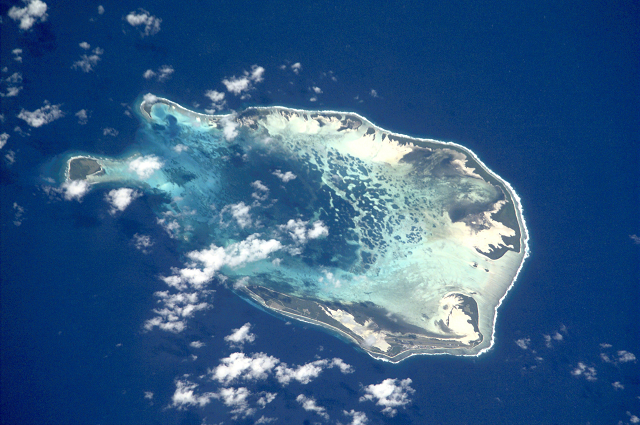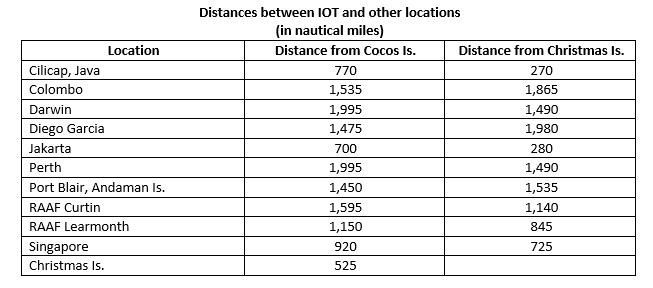
Last November the Joint Standing Committee on the National Capital and External Territories
agreed to examine the strategic importance of Australia’s Indian Ocean Territories (IOT)—the Cocos (Keeling) Islands and Christmas Island. The Committee is looking at the changing regional security environment and security contingencies; defence capability in the territories and associated infrastructure development; the scope of maritime, air and other cooperation with Indo-Pacific partners; and impacts on local communities.
I recently participated in a public forum convened by the Committee. My remarks were based on a submission I authored with the University of Wollongong’s Sam Bateman. Our submission is
here (#2). (Sam and I previously wrote the ASPI report,
Our western front: Australia and the Indian Ocean.)
While the IOT comprise the Cocos (Keeling) Islands and Christmas Island, it’s important to point out that defence capability and strategic issues vary greatly between them.
But their strategic value is limited by their remoteness and difficulties of resupply, particularly by sea. As can be seen in the table below the IOT are closer to Southeast Asia than they are to main air bases in Australia.

Providing satisfactory sovereignty protection around Christmas Island is a particular concern. It’s got no secure anchorage and its wharf area at Flying Fish Cove is fully exposed to north-westerly winds. There can be periods of several weeks on end during the wet season (November through April) when ships are unable to get alongside to discharge their cargo. Small amounts of cargo can then be lightered ashore but nothing in any quantity.
There are several reasons why a major development of the Cocos Islands like Diego Garcia isn’t a good idea. In comparison with Diego Garcia, the land area of the Cocos Islands is smaller (only about 14 square kilometres) and the main lagoon less navigable. The work required to develop a main base at the Cocos Islands would be extensive, highly damaging to the environment and disruptive for the local population.
The resupply of fuel to support the anti-air defences of the islands would be extremely difficult. Daily aviation fuel requirements could be in the order of hundreds of tons or greater, particularly if fighter aircraft were to be deployed there. Resupply in such quantities would be highly problematic if the islands were under air attack from Southeast Asia. There’s also the issue of weather. Diego Garcia is five degrees closer to the equator than the Cocos Islands which means that it’s much less affected by cyclones and bad weather.
An unhardened base there would be a liability more than an asset. Despite their current strategic importance, the IOT would be extremely difficult in time of conflict to defend against an adversary with access to bases in Southeast Asia. Indeed, their location is within 600 nautical miles of Sumatra and Java, and thus vulnerable to air or missile attack. It would be virtually impossible for Australia to retake them if they were occupied by such an adversary.
For those reasons, Sam and I don’t support major defence infrastructure developments in the islands, beyond the upgrading of the Cocos airfield and increases to the current storage arrangements for aviation fuel and marine diesel.
An expanded and well-resourced Australian strategic presence on Christmas and Cocos (Keeling) Islands would enable closer maritime security and other forms of defence cooperation with a range of Indo-Pacific partners. These might include the US, France and the UK as long-standing strategic partners, and Singapore and Malaysia (the Southeast Asian members of the Five Power Defence Arrangements).
India, with whom our strategic relationship is
slowly growing, may also have an interest in access to the IOT: the latest strategy document of the Indian Navy,
Ensuring Secure Seas: Indian Maritime Security Strategy (2015), puts an increased focus on ‘undertaking cooperation and coordination between various navies, to counter common threats at sea.’ (ASPI’s Malcolm Davis took a close look at India’s interest in the Cocos islands in
his submission (#9) to the Committee.) There may, in due course, be some Australian interest in
approaching New Delhi about using India’s Port Blair for our P-8A Poseidon maritime surveillance aircraft on a reciprocal basis.
From time to time Indonesia has
expressed concerns about the presence of US marines in Darwin and may also have concerns about any American use of the IOT especially Christmas Island. Given the IOT’s proximity to Indonesia, Canberra should keep Jakarta informed about possible American use of the IOT, and the extent to which any developments there might affect Indonesia. There may also be scope for Australia–Indonesia maritime cooperation around the IOT, something that ASPI’s executive director Peter Jennings supported in his submission (#11) to the Committee.
Australia’s fortunate to have our offshore island outposts in the Indian Ocean. By investing in them in the years ahead the government has an opportunity to increase their strategic importance and utility.
[1] agreed to examine the strategic importance of Australia’s Indian Ocean Territories: http://www.aph.gov.au/Parliamentary_Business/Committees/Joint/National_Capital_and_External_Territories/StrategicImportanceIOT
 Print This Post
Print This Post
